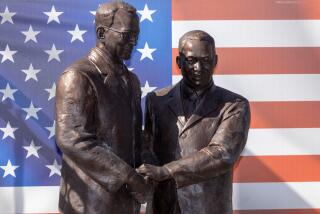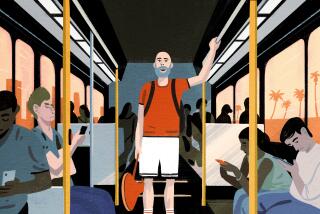Bus Ride That Moved a Nation Is Recalled : Civil rights: Rosa Parks, 77, visits an L.A. school and urges children not to forget the lessons of the past.
- Share via
In the mind of a child a few years is often a lifetime away, and a historic moment is something only read about in textbooks.
But the past and present took on a very special meaning Thursday when a frail, elderly woman with a familiar name in history came to visit the 600 students at Windsor Hills Magnet School in Los Angeles.
She was Rosa Parks, the woman whose refusal to give up her seat to a white passenger on a Montgomery, Ala., bus in 1955 sparked a citywide bus boycott that lasted 381 days and earned her the title “the Mother of the Civil Rights Movement.”
“This is a very special moment in time,” said LaVerne VanZant, principal at Windsor Hills. “She has given us a legacy which we will all like to live up to.”
The moment was not lost on the many children and their parents who crowded the auditorium to experience the soft-spoken woman who defied segregation laws. They took pictures and thanked Parks, who sat quietly in front of the audience, her hands folded on her lap, her hair pulled back in a bun.
“She did the right thing. She went to jail for what she believed in,” said Reginald Flowers, 11. “I’ve been reading about her and Martin Luther King since I was in the third grade. Its an honor to see the woman who help get us freedom.”
Parks, who had been invited by parents to speak and receive an award, sat for pictures with students from each class in the school. The 77-year-old Detroit woman answered questions from students and relived the story that many in the young audience already knew by heart.
She said she recalled being very tired that fateful day on the bus when, on her way home from work, she refused to give up her seat as the segregation laws against blacks required her to do.
“I wasn’t scared or frightened but I was determined to let them know I was not happy with the way I was being treated,” she said. “Under segregation, you had to put aside your dignity--seating in a segregated section was never pleasant. It was very humiliating. It made you feel like you were not being treated like a human being.”
Despite being arrested for remaining in her seat, Parks never paid the $14 fine, nor did she ride on a public bus in the city again until they were desegregated a year later. The leader of the subsequent bus boycott was a young minister named Martin Luther King Jr.
“I still feel grief over his loss,” she said of King’s 1968 assassination. “But others have come forward and kept the movement going.”
While urging the students to study hard and respect authority, she said they should never forget the lessons of the past.
“I lived under the worst kind of conditions,” said Parks. “You are fortunate you don’t have to and I hope you never have to go through what I experienced. We still have to face racism today and the past will prepare you for the future.”
When she finished, the audience gave Parks a standing ovation.
“Our children are seeing a bit of history,” said Wilma Miller, the mother of a sixth grader. “This is a dream come true. When they grow up they will be able to say they saw a woman who had an impact on their lives.”
Lesley Kyle, a sixth-grader, said she was proud to have met the woman who inspired so many. “She was very courageous,” she said.
“She has helped me to understand more about myself,” said Epatha Harris, 11, who echoed the praise.
Many of the parents took long lunch breaks from work for the chance to see Parks.
“I could say I owe my job on the police force in part to the struggle of people like Rosa Parks,” said Marion Newton, a Los Angeles police officer who dropped in to take pictures of Parks and his son, Bryan.
Parks, who has been written about in many books and is writing her autobiography, seemed slightly embarrassed by the praise.
“I’m honored,” she said softly.
More to Read
Sign up for Essential California
The most important California stories and recommendations in your inbox every morning.
You may occasionally receive promotional content from the Los Angeles Times.













